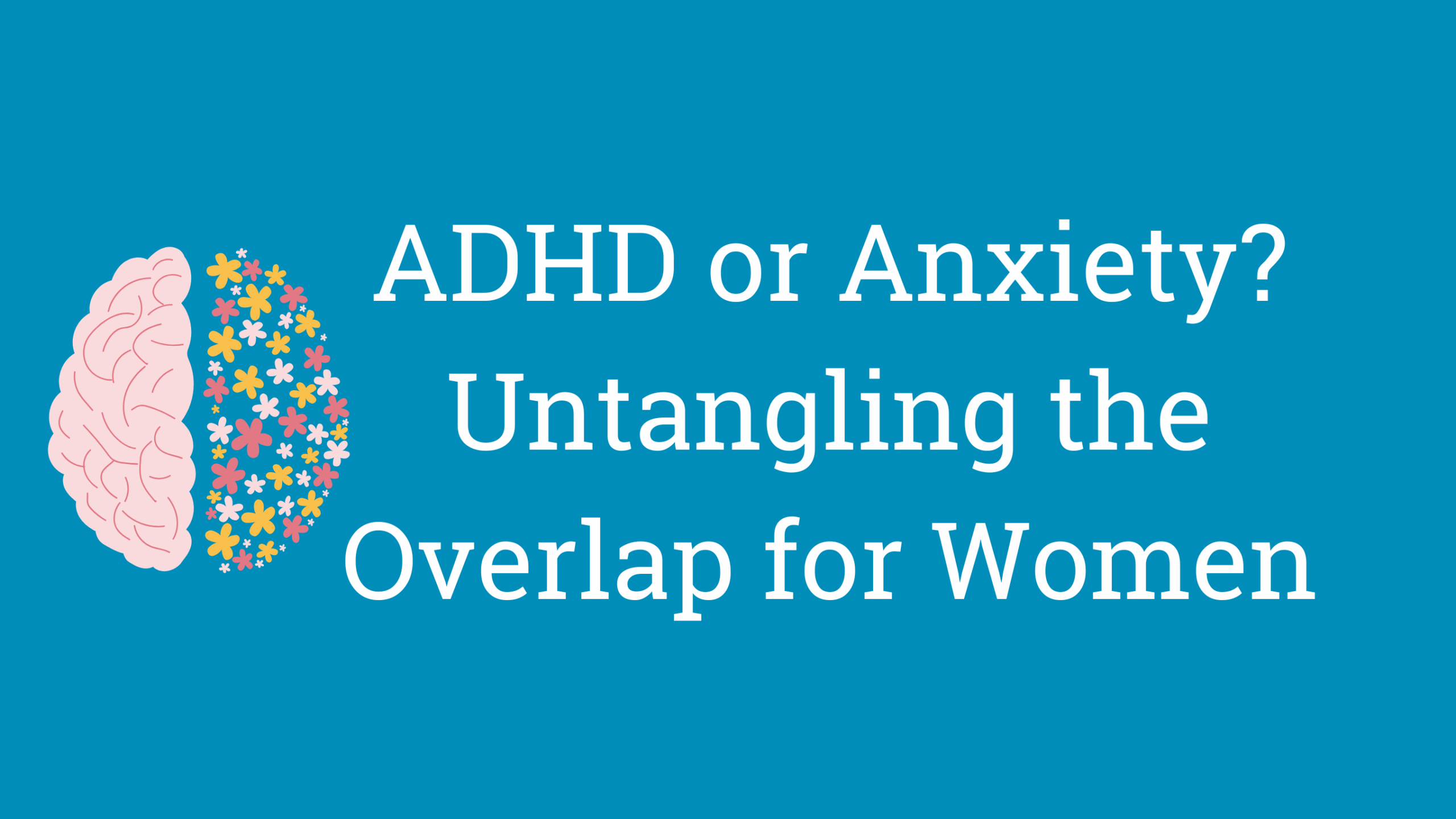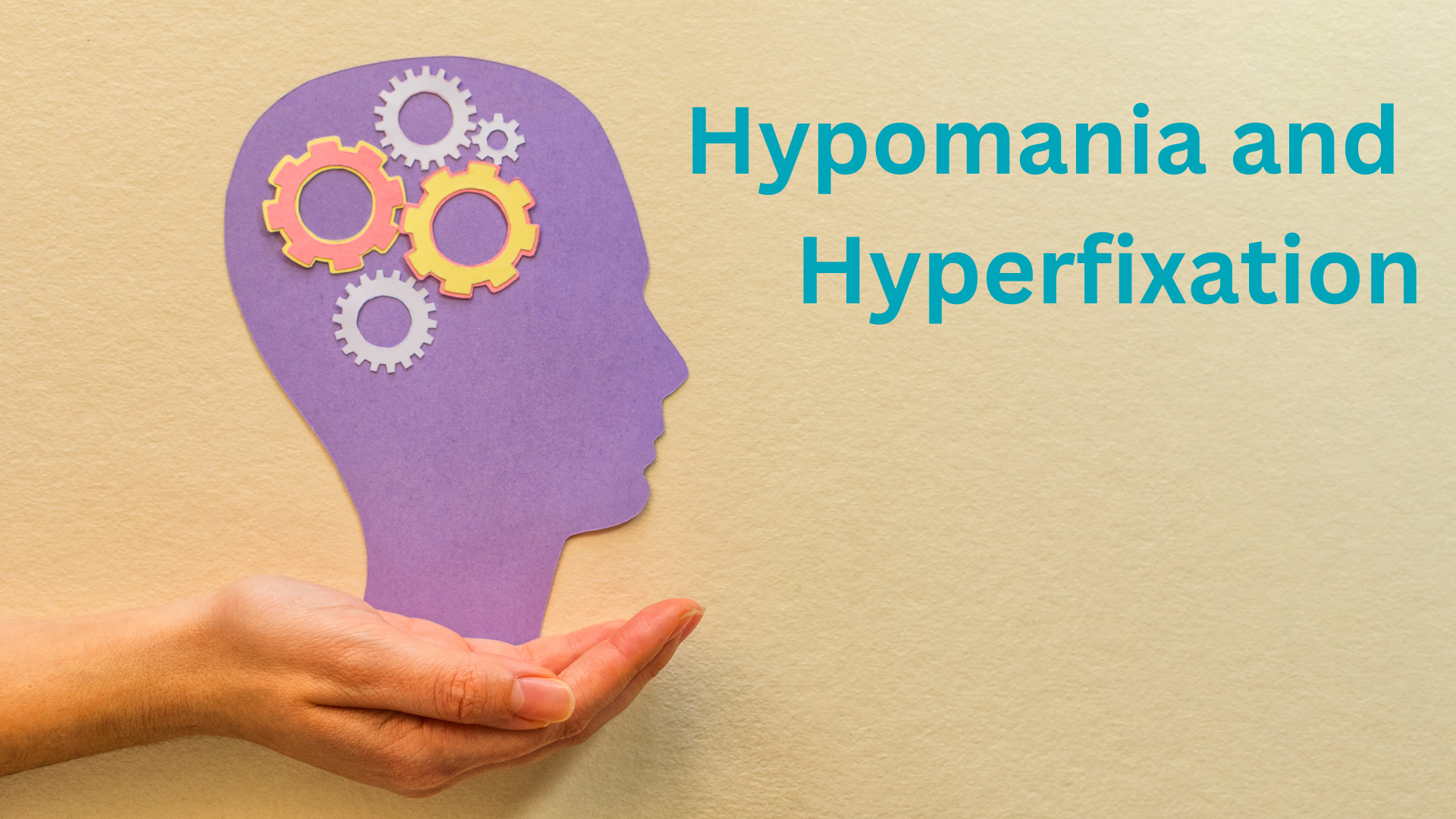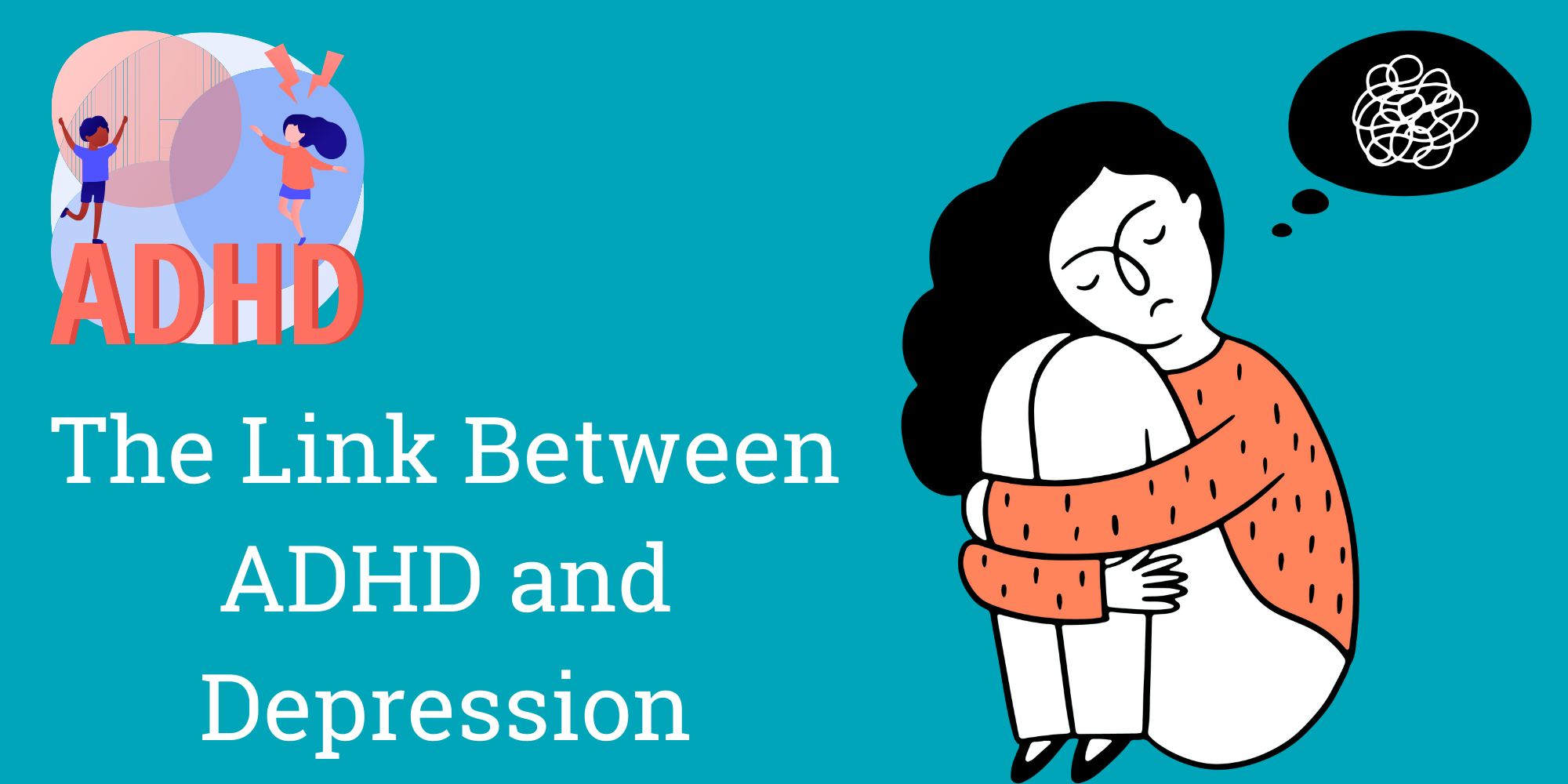
ADHD or Anxiety? Untangling the Overlap for Women
Can’t remember why you walked into the room—again? Feel like your mind’s always in overdrive, yet somehow never quite lands on what it’s supposed to? If you’re a woman juggling work, family, and expectations, you may have started to wonder: Is this anxiety? ADHD? Both? And why does it feel like nobody else is struggling quite this much?
You’re not imagining things—and you’re not alone. Many women, especially in mid-life, begin to notice difficulties with focus, forgetfulness, restlessness, or an undercurrent of worry that just won’t quit. Often, these symptoms overlap between ADHD and anxiety, and it’s easy to feel unsure of what’s really going on.
In this article, we’ll explore how these two conditions can mimic, mask, or intensify each other—especially in women. More importantly, we’ll talk about how to find clarity, and why there’s every reason to be hopeful.
Why It’s So Hard to Tell the Difference
ADHD and anxiety are distinct, but they share a lot of surface symptoms: distractibility, racing thoughts, trouble finishing tasks, irritability, sleep issues. It’s not uncommon for someone to walk into a mental health evaluation, certain they have one, only to find they actually have both—or that their struggles were misattributed all along.
One key difference lies in what’s driving the distraction. Anxiety tends to fill your mind with worry: “What if I said the wrong thing? Did I forget to follow up? What if I fail?” With ADHD, your mind may drift because it’s simply hard to stay engaged or organized—even if nothing is stressing you out in the moment.
Both can be frustrating, exhausting, and isolating. And unfortunately, women are more likely to be misdiagnosed or overlooked altogether, especially if their symptoms don’t fit the “typical” (often male) presentation of ADHD.
What ADHD Often Looks Like in Women
Women with ADHD often fly under the radar. Instead of hyperactivity, they might experience:
- Mental clutter: A brain that never seems to slow down, bouncing from one thought to the next.
- Forgetfulness: Missed appointments, lost items, conversations that drift before they’re done.
- Time blindness: Struggling to estimate how long things will take—or remember how long you’ve already been doing something.
- Emotional intensity: Feeling things deeply, and sometimes reacting quickly, even when you wish you wouldn’t.
- Chronic self-doubt: The sense that you’re always a step behind, no matter how hard you try.
Many women with ADHD become experts at compensating. They build elaborate systems, checklists, or routines to hold it all together. From the outside, it might look like they have it all under control. On the inside, it feels like they’re barely holding on.
How Anxiety Shows Up Differently in Women
While anxiety is more widely recognized, it’s not always understood well—especially when it shows up in high-achieving women who appear “fine.” Anxiety might include:
- Constant worry and second-guessing.
- Tension and restlessness that you carry in your body, even when nothing seems “wrong.”
- Perfectionism that isn’t about excellence—it’s about trying to prevent anything bad from happening.
- Irritability, exhaustion, or guilt—often from juggling too many roles or trying to meet impossible expectations.
In many women, anxiety becomes a quiet, internal pressure—rarely visible to others, but always humming in the background.
When You Have Both
ADHD and anxiety often travel together. Sometimes, anxiety develops as a response to undiagnosed ADHD. For example, if you’ve spent years missing deadlines, forgetting things, or feeling scattered, it makes sense that you’d start to worry constantly. You may have learned to expect negative feedback or disappointment—and now live in fear of the next mistake.
On the other hand, chronic anxiety can make it hard to concentrate, leading to ADHD-like symptoms. You might re-read the same email several times because your mind keeps jumping to something else. Over time, it becomes hard to tell what’s driving what.
Understanding that these conditions can co-exist—and influence each other—is a crucial part of building a treatment plan that works.
How to Move Toward Clarity
Sorting this out isn’t something you need to do on your own. A thoughtful, comprehensive evaluation with a qualified mental health professional can help you understand what’s underneath the symptoms you’re experiencing. This isn’t about putting you in a box or assigning a label—it’s about gaining insight into the patterns that have shaped your day-to-day life, so that you can make decisions with more clarity and compassion.
A good evaluation includes more than just a questionnaire. It should consider your life story, your strengths, your challenges, and how your symptoms have changed over time. It’s a conversation—not a checklist—and one that can open the door to real relief.
Treatment Can Be Life-Changing
Whether you’re dealing with ADHD, anxiety, or both, treatment can make a meaningful difference. That might include:
- Therapy, which can help you learn skills to manage thoughts, reduce overwhelm, and respond differently to stress.
- Lifestyle changes like improving sleep, building structured routines, and using technology to stay organized.
- Medication in some cases, if appropriate, to support focus or reduce chronic anxiety.
- Education and support, so you can better understand how your brain works—and stop blaming yourself.
Treament isn’t about “fixing” you. It’s about giving you tools to work with your brain instead of fighting it. Many women report a profound sense of relief when they realize they’re not lazy, flaky, or “too sensitive”—they just have a brain that’s wired differently.
You’re Not Broken—and You’re Not Alone
If you’ve spent years trying to figure out why everything feels harder than it should, wondering why you can’t just “get it together” like everyone else seems to—please know this: it’s not a character flaw. And you’re not the only one.
There are real explanations. And more importantly, there is real help.
The path forward starts with understanding. From there, you can build a plan that supports you—your brain, your life, and your goals. Whether that means learning new skills, setting better boundaries, or simply being kinder to yourself on tough days, the result is the same: more calm, more clarity, more hope.
Whatever it is you’re facing, you don’t have to figure it all out on your own. There are people who understand—and there are steps you can take today.
We’re here when you need us. For questions, click here to get started.
Learn More
Hypomania and Hyperfixation: What’s the Difference?
Mental health conditions can manifest in various ways, and two related concepts that often come up in discussions about mental health are hyperfixation and hypomania. Hyperfixation is an intense preoccupation with a particular object, activity, or topic, while hypomania is a state of elevated mood and energy that is less severe than full-blown mania.
While both hyperfixation and hypomania can have a significant impact on a person’s life, they are distinct phenomena that are associated with different underlying conditions.
In this blog post, we will explore the similarities and differences between hyperfixation and hypomania, as well as their respective causes, symptoms, and treatments. Whether you or someone you know is struggling with hyperfixation or hypomania, understanding these concepts is an important step in seeking the right help and support for optimal mental health.
Are Hyperfixation and Hypomania the Same Thing?
No, they are not.
Hypomania is a specific syndrome that occurs in patients with bipolar disorder and is characterized by a period of at least four consecutive days during which a person experiences persistently elevated, expansive, or irritable mood and abnormally and persistently increased activity or energy.
Hyperfixation is a phenomenon that can occur in various mental health conditions. For instance, people with OCD can become hyperfixated on a specific obsession, individuals with generalized anxiety disorder may become hyperfixated on worries about the future, and those with PTSD or complex trauma can become hyperfixated on intrusive memories from the past.
Additionally, people with ADHD may become hyperfixated on projects they are highly interested in, while individuals with severe mental illnesses such as psychosis may become hyperfixated on a specific delusion.
In other words, it is clear that hyperfixation and hypomania are not the same thing.
Similarities between Hyperfixation and Hypomania
Hyperfixation and hypomania share some similarities in that they both involve a heightened state of focus and energy. In both cases, a person may feel driven to pursue a particular interest or activity, often to the point of neglecting other responsibilities or obligations.
Differences between Hyperfixation and Hypomania
However, there are also important differences between the two. Hyperfixation is not necessarily accompanied by changes in mood or energy level, whereas hypomania is a distinct state of elevated mood and activity. Hypomania is also a symptom of bipolar disorder, whereas hyperfixation may be seen in a range of conditions, including ADHD or Obsessive-Compulsive Disorder (OCD).
It is important to note that while hyperfixation may be a symptom of certain conditions, it is not itself a medical diagnosis. Hypomania, on the other hand, is a clinical syndrome that requires immediate evaluation and treatment by a mental health professional.
Hyperfixation refers to a strong and intense fixation on a particular object, activity, or topic, to the point where it becomes difficult to focus on anything else. Hypomania, on the other hand, is a symptom of bipolar disorder and refers to a state of elevated mood, energy, and activity that is less severe than full-blown mania. People experiencing hypomania may feel overly confident, euphoric, and impulsive, and may engage in reckless behavior, such as overspending, gambling, or sexual promiscuity.
How Are They Treated?
If you notice signs of hypomania or hyperfixation in yourself or someone you know, it is important to seek professional help. Here at NextStep2MentalHealth, our multidisciplinary team can assess the situation, provide an accurate diagnosis, and recommend an appropriate course of treatment.
For hypomania, treatment may include medication, therapy, or a combination of both. The specific treatment plan will depend on the severity of the symptoms, the underlying cause, and other individual factors. It is important to note that hypomania can escalate into full-blown mania if left untreated, which can have serious consequences on a person’s life and well-being.
For hyperfixation, treatment will depend on the underlying condition. For example, if hyperfixation is a symptom of ADHD, treatment may involve lifestyle modifications, therapy, medication, or a combination of both to help manage symptoms and improve daily functioning. If hyperfixation is a symptom of OCD, treatment may involve exposure and response prevention therapy, medication, or a combination of both.
It is crucial to seek help as soon as possible if you or someone you know is experiencing symptoms of hypomania or hyperfixation. Early intervention can lead to more effective treatment outcomes and a better quality of life.
We’re Here for You
If you are struggling with any sort of mental health issues — whether that’s signs of hyperfixation or signs of hypomania, seeking help from a mental health professional can make a significant difference in your life. Here at NextStep2MentalHealth, we understand that seeking help can be challenging, but we are here to support you every step of the way.
Our experienced mental health professionals provide a safe and supportive environment for you to explore your thoughts and feelings, develop coping strategies, and work towards your mental health goals. Don’t hesitate to reach out to us for help – we are here for you. Schedule your appointment here.
Learn More
ADHD and Depression Connection
There are many types of depression: major depression, postpartum depression, bipolar depression, and seasonal affective disorder. Not only are there many types of depression, but depression can also occur at the same time as other mental health conditions. It’s very common for those with anxiety or ADHD to also have depression. This is called comorbidities.
Here at NextStep2MentalHealth, our multidisciplinary team of experts excel at diagnosing and treating comorbidities, including ADHD and depression.
In this article, we take a closer look at the ADHD and depression connection.
The ADHD and Depression Connection
Here are a few quick facts from the video:
- 30% of those with ADHD experience depressive episodes
- Dopamine is responsible for reward systems, mood, and those with ADHD may not have access to as much dopamine
- This leads to the potential feeling like “you’re running on half a tank”
- Those with ADHD may struggle more with emotional dysregulation, which means it can take longer to soothe after difficult emotions
Dopamine is a type of neurotransmitter, and it’s often called the “feel good” hormone. Your body makes it, and your nervous system uses it to send messages between nerve cells. Low levels of dopamine may contribute to feelings of depression.
Do You Have Depression?
If you have ADHD, you might also suspect you have depression if you can’t shake intense sad feelings, notice changes to your eating and sleeping routine, feel worthless or guilt, and lose passion for your favorite hobbies.
You can learn more about depression in these resources:
- How Untreated Depression Can Impact Your Health
- Teen Depression: What to Look For and How to Help
- 32 Ways to Help Someone with Depression (When They Don’t Want to Talk About It)
- 8 Risk Factors for Depression
- Do You Have Depression or Seasonal Affective Disorder?
- Overcoming the Negative Self-Talk Cycles of Depression
- 6 Uncommonly Thought Of Depression Symptoms That Shouldn’t Go Unnoticed
Treating ADHD and Depression

If you have both ADHD and depression, you need treatment that addresses the complexities of each condition. For example, you may benefit from strategies that promote emotional regulation. Other treatments for both ADHD and depression include:
- Medication (depression and ADHD both benefit from different types of medication)
- Lifestyle modifications, including regular exercise, good sleep hygiene, eating a balanced diet, and practicing stress management techniques
- Therapy
What to Do If You Think You Have Depression
With the right treatment, you can manage the symptoms of both of these conditions. Here at NextStep2MentalHealth, our team of experienced providers is skilled at diagnosing and treating many types of depression, including major depression, seasonal depression, and postpartum depression as well as adult and child ADHD.
If you’d like to make an appointment with our compassionate and knowledgeable providers, click here to make a telehealth or in-person appointment in our Louisville, Kentucky office. You can also call us at 502-339-2442.
Learn More
Is ADHD real?
ADHD is a biological illness involving deficits in the function of the prefrontal cortex and related neuronal pathways involved in processing…
Learn More
What is Mental Health?
Mental health is the state of well-being in which people understand their own potential, are capable of dealing with life’s stresses and challenges,
Learn MoreADHD in High Functioning Adults
One common fallacy about ADHD is that high functioning adults can’t possibly have ADHD. Many people assume that adults with ADHD are incapable of…
Learn More